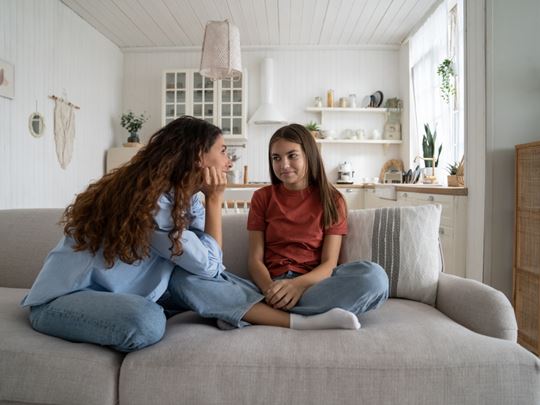How to talk to your children about fostering
Here are some of our favourite tips on how to talk to your children about fostering.

At Fostering People, we understand that when you make the amazing decision to foster, it’s something that doesn’t just impact you, but your whole family.
And if you have children at home, fostering will affect them too. Ensuring the wellbeing and happiness of your own children is always a priority (for us as well as you), as is the care and comfort of your foster child.
You might be concerned about how your children will react to the news of having a new foster sibling. However, with the right conversations, planning, support, and strategies, introducing the idea of fostering to your children can help things go much smoother. This helps to make your fostering journey a success and a joy for everyone involved.
How fostering can impact your children
Becoming a foster parent and caring for a child can affect your own children in many ways. The family dynamic they have always known suddenly changes, and they have to get used to the idea of a new sibling in the home.
Some of the challenges your child might experience could include things such as:
- Sharing - their home, possessions, parents, and space
- Having a foster sibling with a completely different background from them
- Dealing with the loss of a foster sibling once the placement ends
- Adopting certain behaviours of the foster child
While these things can be difficult to tackle, being open and responsive can help your children adjust to the changes fostering can bring. And if you’re ever unsure, we’re here 24/7 to provide support and guidance to help you and your children.
The reality of having a foster child living with you might be a bit strange for your young ones to get used to, but fostering brings so many benefits for the whole family, including your new foster child. Here are some ways fostering can benefit your children:
- A new sibling and friend to play and bond with (both during the foster process and beyond in many cases).
- A deeper understanding of empathy - many foster children come from difficult backgrounds, and this can teach your child to have more patience, understanding, and empathy for others.
- Getting to know people from different walks of life, whether it’s from their foster sibling or the other foster families they’ll meet when you become a part of the Fostering People family.
- Learning to share and be welcoming, which are fantastic life skills they can take with them as they grow.

Strategies to talk to your children about fostering
Fostering is something the whole household has to be on board with, especially if you have children living at home.
Here are some strategies you can implement to help everyone get on the same page:
- When the time comes to talk to your children about your plans to foster, or that you’re considering fostering, bring it up at a time when the family is relaxed. Maybe over dinner together or when you’re doing a family activity such as a walk or playing a game. You might find it easier to talk and your children might be more open to the idea if everyone is feeling calm.
- Arm yourself with as much information as possible. When you talk about fostering, your children are more than likely to have some questions. By speaking with us first and doing some research, you’ll be far better equipped to answer any questions they might have.
- Create a pros and cons list together. Talk about the advantages and disadvantages of fostering; how you’ll be making a huge difference in a child’s life, you’ll be teaching your children a wealth of amazing lessons, you’ll be able to maintain a good work/life balance, your child will have the opportunity to make bonds with children from many different walks of like, etc. It’s also important to understand any potential cons. Some children have had difficult pasts and might exhibit behaviour your children aren’t used to. How can you work as a family to help them heal?
- If your children are very young and you’re concerned about how to talk to them, role-playing with dolls or action figures can be a great way to introduce them to the idea and help them understand the idea of foster care.

Tips for how to talk to your children about fostering
The most important thing is to always keep communication open and honest. It’s natural and normal for your children to be curious about this new person who will become part of your family, so having conversations where they’re allowed to ask any questions they want is crucial.
Here are some of our favourite tips on how to talk to your children about fostering.
Get excited
Fostering a vulnerable child is one of the most selfless and rewarding things you can do. Yes, it can come with its challenges, such as fostering a child with additional needs, but it's also a wonderful way to promote love and togetherness, and welcome a new addition to the family.
When you talk to your children about your intentions to foster, be excited. Gather the family together and talk about how you all love each other so much that you want to share this love with a child who desperately needs it. Let them know that they’re going to welcome a new brother or sister into your home, so they’ll have someone new to play with. Many foster siblings go on to have a life-long bond, which can be such an amazing gift.
Encourage questions
Your children will most likely be curious about their new foster sibling, so you should encourage them to ask as many questions as they want. Questions such as how they feel about having a foster sibling, if there is anything they want to know about them (their age, sex, name, cultural background, etc), if there is anything they would like the foster child to know about them, what they’re looking forward to or feeling anxious about, what bedroom the foster child will be living in, etc.
Remember, there are no ‘bad’ questions, but if you need some support in answering them, then that’s what we’re here for.
Reassure them
Your children might be feeling anxious that when a foster child comes into the home, they might not get as much attention from you. Reassure them that there will be no favouritism, and they will not be forgotten or pushed aside. Instead, explain to them that the family has so much love to give that all you are doing is sharing that love with a child who needs it. They will still be cared for and included, as well as given the incredible chance to make a new friend.
Be honest about fostering
A good way to talk about fostering is to explain why children need foster care. Depending on the age of your children, you can be open and honest and explain that some children come from difficult homes or have parents that can’t look after them, and they need loving and caring families, like yours, to help. It can be a bit tricky to talk about, especially as some foster children come from traumatic backgrounds, but we can help you have those conversations.
Get them involved
Involving your children in welcoming a foster child can be a great way to make them a part of the fostering process. Talk about how their new sibling will be a part of the family and they will need to share your space, food, and you. If they know that these are things the foster child might not have had before, they might be more open to the idea. You can ask their opinion on how to decorate the room, what clothes or toys they might like if they’d like to help plan meals that your foster child enjoys, and if they’d like to plan some fun trips or activities to do when the child arrives. You could also suggest writing them a letter welcoming them into the home, or drawing them a picture if they can’t write yet.
Keep communication open
There are bound to be some issues during your fostering journey, and it’s important to let your children know they can talk to you anytime about anything that’s bothering them. They might feel uncomfortable about talking about certain things, or that they might get judged or upset you, but their feelings are always 100% valid and they need to know that. If we hold things inside us, it can lead to feelings of resentment or anger, which won’t help anyone. So, if you can see your child struggling, or you can tell they want to talk about something, gently encourage them to open up, without any judgement.
Talking is empowering, and by discussing their feelings, you can work with them to find a solution.
Give them your time
Even though fostering is a full-time job and you will need to dedicate your time to caring for your foster child, it shouldn’t be at the expense of your own children. If they are worried that they might get forgotten about, reassure them that you will always have time for them. You could even discuss having a time slot every day or week where you spend quality one-to-one time with them, doing something they enjoy. This could be something as simple as reading a story or watching a film together. Make sure they always feel included and that you love them just as much now as before.
Fostering People are here for your whole family
At Fostering People, we know that the happiness and comfort of your children are essential. And when you foster with us, you will never be alone. We’re here to support you and your children from the very start, with access to our dedicated social workers and fostering team whenever you need us.
We also plan lots of fun activities and events throughout the year for your children to enjoy, giving them the opportunity to participate and be considered through every stage of the journey.
If you have any questions about fostering, and how it might impact your children, get in touch with our friendly team today. We’re always here to provide the answers and support you need.